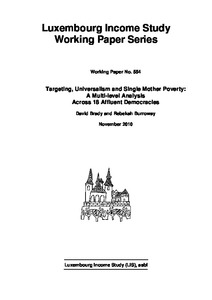Targeting, universalism and single mother poverty: a multi-level analysis across 18 affluent democracies

Brady, David ; Burroway, Rebekah
LIS - Luxembourg
2010
40 p.
comparison ; international ; one parent family ; poverty ; social policy ; statistics ; women
Working Paper Series
554
Income distribution
English
Bibliogr.
"We examine the influence of individual characteristics and targeted and universal social policy on single mother poverty with a multi-level analysis across 18 affluent democracies. Although single mothers are disproportionately poor in all countries, there is even more cross-national variation in single mother poverty than for poverty among the overall population. By far, the U.S. has the highest rate of poverty among single mothers. The analyses show that single mother poverty is a function of the household's employment, education, age composition, and the presence of other adults. Beyond individual characteristics, social policy exerts substantial influence on single mother poverty. We find that two measures of universal social policy significantly reduce single mother poverty. Alternatively, one measure of targeted social policy does not have significant effects, while another measure is only significantly negative when controlling for universal social policy. Moreover, the effects of universal social policy are larger. Additional analyses show that universal social policy does not have counterproductive consequences in terms of family structure or employment, while the results are less clear for targeted social policy. Although debates often focus on altering the behavior or characteristics of single mothers, welfare universalism could be an even more effective anti-poverty strategy."
Digital
The ETUI is co-funded by the European Union. Views and opinions expressed are however those of the author(s) only and do not necessarily reflect those of the European Union or the ETUI.